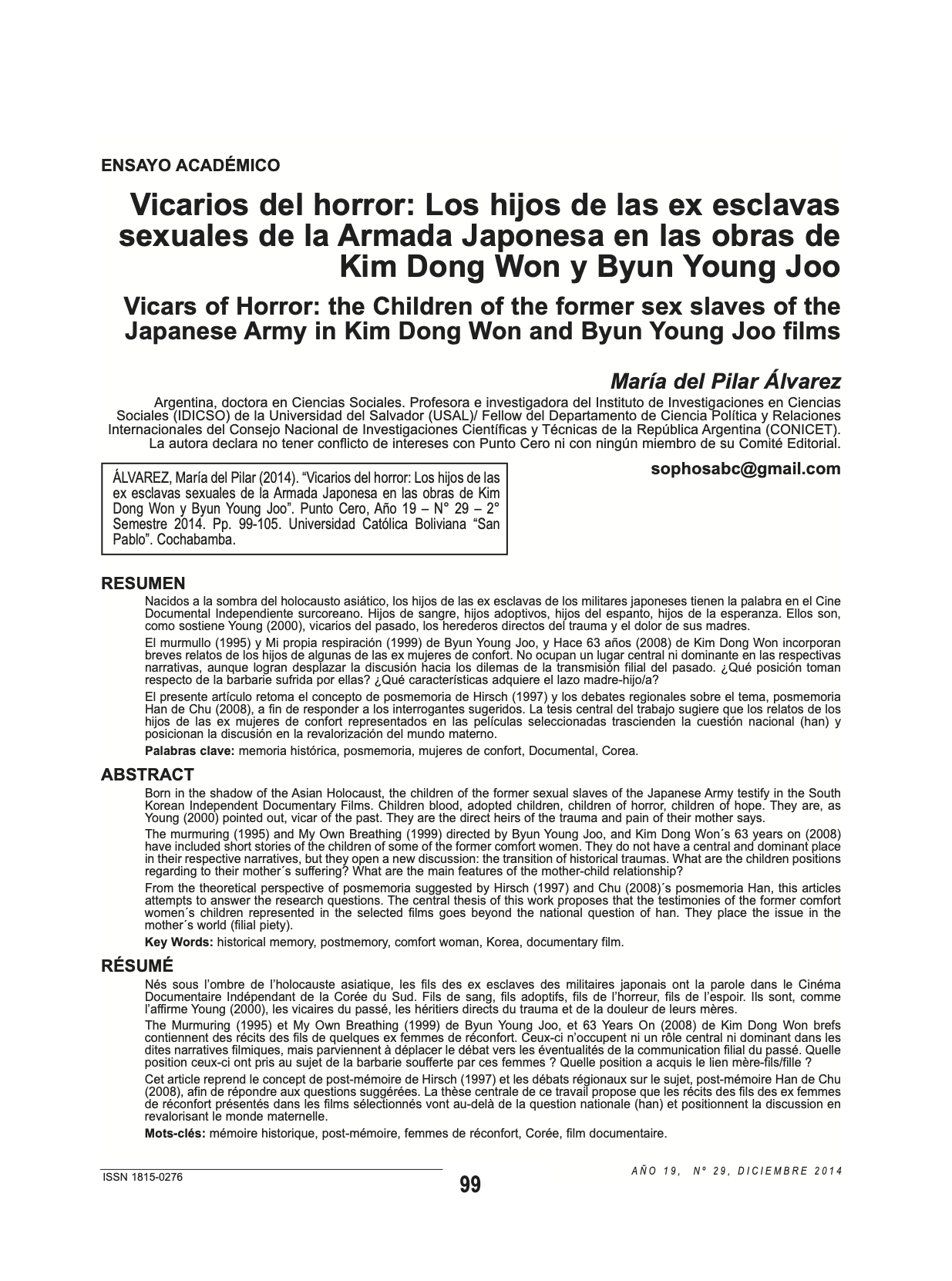Vicarios del horror: Los hijos de las ex esclavas sexuales de la Armada Japonesa en las obras de Kim Dong Won y Byun Young Joo
DOI:
https://doi.org/10.35319/puntocero.201429122Palabras clave:
Memoria Histórica, Posmemoria, Mujeres de Confort, Documental, CoreaResumen
Nacidos a la sombra del holocausto asiático, los hijos de las ex esclavas de los militares japoneses tienen la palabra en el Cine Documental Independiente surcoreano. Hijos de sangre, hijos adoptivos, hijos del espanto, hijos de la esperanza. Ellos son, como sostiene Young (2000), vicarios del pasado, los herederos directos del trauma y el dolor de sus madres. El murmullo (1995) y Mi propia respiración (1999) de Byun Young Joo, y Hace 63 años (2008) de Kim Dong Won incorporan breves relatos de los hijos de algunas de las ex mujeres de confort. No ocupan un lugar central ni dominante en las respectivas narrativas, aunque logran desplazar la discusión hacia los dilemas de la transmisión filial del pasado. ¿Qué posición toman respecto de la barbarie sufrida por ellas? ¿Qué características adquiere el lazo madre-hijo/a? El presente artículo retoma el concepto de posmemoria de Hirsch (1997) y los debates regionales sobre el tema, posmemoria Han de Chu (2008), a fin de responder a los interrogantes sugeridos. La tesis central del trabajo sugiere que los relatos de los hijos de las ex mujeres de confort representados en las películas seleccionadas trascienden la cuestión nacional (han) y posicionan la discusión en la revalorización del mundo materno.
Citas
Álvarez, María del Pilar (2013). “Las huellas de la colonización y el deber de la memoria: Apuntes desde el cine documental surcoreano”, Revista Estudios de Asia y África, Vo. XLVIII, Mayo-Agosto, N 2, Colegio de México, México, 381-410.
- (2012). “Usos del testimonio en los documentales de las mujeres de confort: límites y obstáculos de su representación” en Carolina Mera y Paula Iadevito (comp), Presencias culturales en el mundo global (pp. 177-190). Buenos Aires, Mnemosyne.
Arnado, Ana (2009). La imagen justa. Cine Argentino y política (1980-2007). Buenos Aires, Ediciones Colihue.
Chu, (2008) "Science Fiction and Postmemory Han in Contemporary Korean American Literature” en MELUS, Vol. 33, No, 4, pp 97-121.
Halbwachs, Maurice (1950)(2011). La memoria colectiva. Buenos Aires, Miño y Dávila Editores.
Hirsch, Marianne (1997). Family Frames. Photography, Narrative and Postmemory. Cambridge, Massachusset and London, Harvard University Press.
- (2008). “The Generation of Postmemory” en Poetics Today, 29:1, pp. 103-128.
Huyssen, Andreas (2001). En busca del futuro perdido. Cultura y memoria en tiempos de globalización. Buenos Aires, Fondo de Cultura Económica.
Young, James (2000). At Memory ́s Edge. After-Images of the Holocaust in Contemporary Art and Architecture. United States of America, Yale University Press.

Descargas
Publicado
Cómo citar
Número
Sección
Licencia
Derechos de autor 2014 Revista Punto Cero

Esta obra está bajo una licencia internacional Creative Commons Atribución-NoComercial 4.0.








